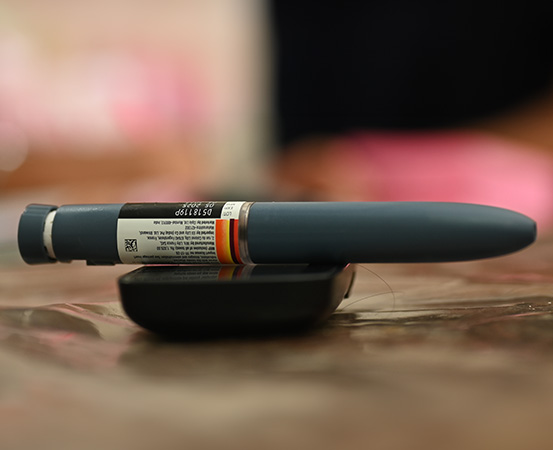
In some cases, physicians may recommend taking insulin to help manage diabetes better. And while it helps manage blood glucose levels, insulin therapy can also cause weight gain, which can be managed with some healthy lifestyle choices.
Insulin is a hormone secreted by the pancreas to help utilize the glucose by the cells and tissues in the body. It also helps store fat and build muscle. Dr Sudeep P Manohar, consultant, endocrinology, Apollo Speciality Hospital, Jayanagar, Bangalore, says, “People with diabetes have insulin resistance or insulin deficiency. As a result, blood sugar levels are not adequately controlled, and energy is not utilized. We replace insulin in such individuals to control diabetes.”
Can insulin cause you to gain weight?
People with Type 1 diabetes have insulin deficiency and cannot survive without insulin after a while. Dr G Sandeep Reddy, senior endocrinologist, Kamineni Hospitals, Hyderabad, adds, “Those with type 2 diabetes usually develop insulin deficiency at a later stage and become insulin-dependent. Moreover, whenever oral glycemic drugs fail, insulin is given. It does not have many side effects and is safe to use even for gestational diabetes [type of diabetes that develops during pregnancy].”
However, insulin can cause some weight gain, say experts. Depending on the individual’s condition, one can put on 2–10 kg. People with insulin deficiency experience weight loss due to loss of fat and muscle mass. So, they regain some weight once they start taking insulin. This is because it is an anabolic hormone that stores fat and improves muscle mass. Dr Reddy says, “It will prevent lipolysis, which is the breakdown of fatty acids. It will cause an increase in muscle mass.”
However, the increase in weight in people with type 1 diabetes is not as much as in those with type 2 diabetes, where insulin resistance is the main problem. Dr Manohar says, “The insulin that is given externally is not physiological; hence, some weight gain can be seen.”
What’s the best type of insulin for weight loss?
Many people on insulin gain weight, which is usually due to overeating. They tend to experience episodes of hypoglycemia or low sugar and eat more to manage it.
According to Dr Reddy, not all types of insulin cause weight gain. “There are different types of insulin — regular or conventional and premixed. Old-generation insulin causes more episodes of low sugar and increases appetite, causing one to put on extra kilos. Comparatively, newer-generation analog insulins cause fewer episodes of hypoglycemia. There is also ultra short-acting insulin, which causes a minimal increase in weight,” he adds.
Does insulin cause belly fat?
Experts say that most fat gets stored around the abdomen. Hence, insulin can cause belly fat. However, there are different measures to help manage weight gain due to insulin. Dr Manohar says, “We use alternative measures like use GLP-1 inhibitors class of drugs. These agents are usually combined. Some of them cause weight loss, and when combined with insulin, there is minimal weight gain, and a few people even lose weight.”
Other side effects of insulin
Apart from weight gain, Dr Reddy says insulin can initially cause pedal edema or swelling of feet when one starts taking it for the first time. However, this lasts only for a short while.
Dr Manohar adds though rare, frequent use of the same needles or preservatives used in insulin can cause some allergies. So, those dependent on insulin are encouraged to change needles and injection sites often. “We see fewer instances of injection site problems these days. Some can develop bumps due to repeated injections in the same place, which is called lipohypertrophy. In rare cases, one can also develop lipoatrophy where the fat at the injection site shrinks away, causing a depression in the skin,” he says.
People can lose weight if they stop insulin. However, this should only be done under medical advice as it can cause high sugar levels and lead to several diabetes complications. Though it is impossible for people with type 1 diabetes to stop insulin, those with type 2 diabetes can sometimes reduce the insulin dose and in rare cases, even stop taking it, if they maintain good control over their blood glucose levels. Dr Reddy explains, “It depends on whether the body is capable of producing enough insulin. We check it with a C-peptide test. If the C-peptide level is relatively high, we tend to withdraw insulin and see how the body responds. If it is low, we cannot withdraw insulin even in those with type 2 diabetes.”
How to stop insulin weight gain?
Weight gain depends on the type of insulin used and one’s dietary intake. Experts suggest different ways to manage weight gain due to insulin by following healthy lifestyle choices like eating healthy, avoiding oily and deep-fried foods, and sticking to a low-calorie diet. Insulin dose should be adjusted according to the meal intake.
Dr Reddy suggests choosing long-acting new-generation insulin for better weight management. A 45-minute moderate-intensity exercise like walking briskly or playing a sport for at least five days a week is recommended. Dr Manohar adds, “Watch your calorie intake. Choose healthier options, including vegetables and lentils. Half of your plate should be filled with veggies, one-quarter with complex carbs like millet and whole grains, and the remaining with proteins like dal, chicken and fish. If you restrict calorie intake and burn more calories, you can control the weight gained or not put on extra kilos at all, even on insulin therapy.”
Takeaways
- Insulin can cause one to put on 2–10 kg of weight.
- Many people on insulin therapy experience hypoglycemia and tend to eat more to manage the low sugar, which in turn causes weight gain.
- Some new-generation insulins are said to cause minimal weight gain.
- Insulin therapy can be combined with other classes of drugs to manage weight gain under medical supervision.
- Eating healthy and working out regularly can help manage weight gain due to insulin.

















